- Home
- international
- news
- Disney's history with LGBTQ issues is complicated — from queer-coded characters to Bob Chapek's botched 'Don't Say Gay' response
Disney's history with LGBTQ issues is complicated from queer-coded characters to Bob Chapek's botched 'Don't Say Gay' response
Chris Panella

- The Walt Disney Company has a long and complicated history with the LGBTQ community.
- Despite recent improvements, the entertainment giant hasn't always shown support.
Disney's early years were defined by American idealism and conservative values.
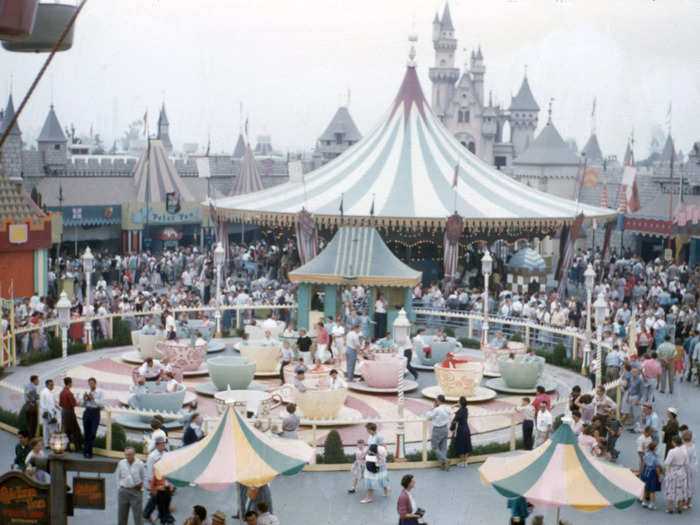
In 1923, brothers Walt and Roy O. Disney founded The Disney Brothers Cartoon Studio, a production house creating animated shorts of soon-to-be iconic characters such as Mickey Mouse. Those early works often followed the plight and success of the "common man," appealing to Great Depression-era audiences, Smithsonian Magazine reported.
By World War II, Disney became a pillar of America's war propaganda efforts, according to The National WWII Museum of New Orleans. Characters became household names and representations of American values, with The New York Times calling Donald Duck "ambassador-at-large, a salesman of the American Way" in 1943.
When the Disneyland park opened in 1955, Walt Disney described it in a speech as a site "dedicated to the ideals, the dreams, and the hard facts that have created America."
Disney theme parks and media were seen as family-friendly entertainment.
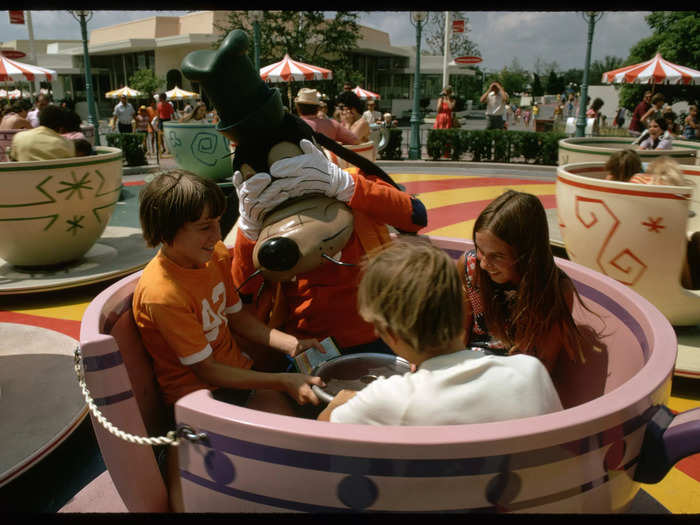
The theme parks — alongside Disney's ever-growing list of film, television, and other entertainment — were widely seen as family-friendly and conservative, Smithsonian Magazine reported. American history and culture were "whitewashed" and often excluded minorities such as the LGBTQ community, according to Politico.
It was a widespread branding, including films and television that featured few, if any, LGBTQ characters, according to CNN. This clean-cut, nuclear-family branding had some supporters, but plenty of critics have called out the company's approach, Politico reported.
LGBTQ fans often found representation in Disney films through "queer-coded" characters.
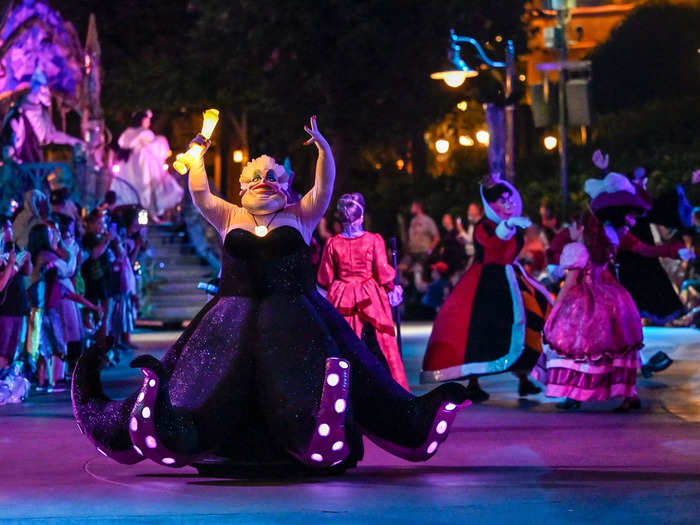
Meanwhile, LGBTQ audiences have embraced Disney characters that could be seen as "queer-coded" rather than explicitly queer, film critic and author Sean Griffin told CNN.
In his book, "Tinker Belles and Evil Queens: The Walt Disney Company from the Inside Out," Griffin explained the history of Disney's relationship with the LGBTQ community and how queer fans have adopted villains such as Scar from "The Lion King" and drag-queen-inspired Ursula from "The Little Mermaid."
Griffin told TIME that these characters "who feel like they're misfits" resonate with queer audiences.
"Eventually what it is that makes them feel like an outsider ends up being the thing that is valued about them. Seeing cartoons that show you that there's somebody else who feels that way and then seeing a happy ending at the end is really powerful," he said.
Another reason LGBTQ audiences have gravitated towards these "queer-coded" characters is due to a company strategy, Griffin told CNN. In the 1980s, Disney began appealing to its queer audiences while trying not to "aggravate the core straight family conservative value audience they also wanted to hang onto," he said.
The result is "a strategy of trying to appeal to both sides and not alienate or insult either side," Griffin added.
Disney's strategy has led to poor representation of LGBTQ people, including blink-and-you'll-miss-it kisses.
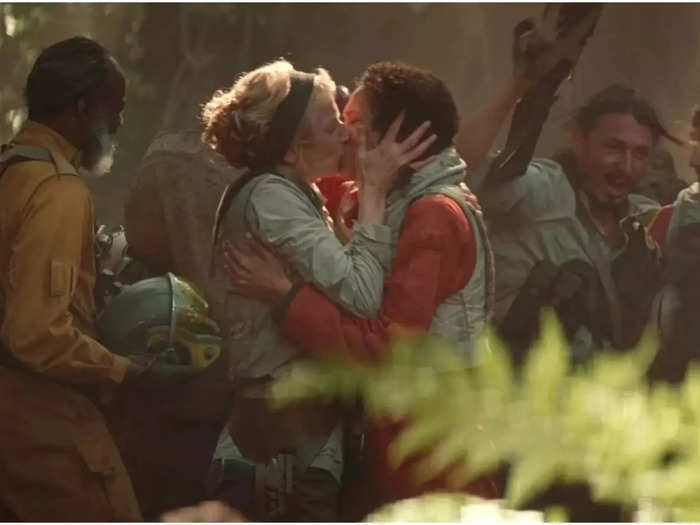
Griffin told CNN it appears that modern Disney media is still following the old playbook, often resulting in poor attempts for inclusion and diversity.
"You can't say 'I don't want to take sides' because people go, 'By you refusing to choose sides, you've chosen a side,'" he said.
GLAAD has given Disney a poor or failing rating for LGBTQ representation in media every year since 2014. In 2019, the organization said no film passed the Vito Russo Test, a GLAAD-created benchmark for queer representation requiring an identifiably LGBTQ character who is significant to the plot and not solely defined by their sexuality.
Plenty of blockbusters such as "Star Wars: The Rise of Skywalker" and the live-action remake of "The Beauty and the Beast" have been marketed as featuring important LGBTQ representation, only to fall flat on that promise. The former featured a "blink-and-you'll-miss-it" kiss between two Resistance soldiers that could've easily been cut out for a disapproving audience.
According to Out, Disney's often heralded "first gay character" moments in its films, with some of the firsts dating back to an antelope couple in 2016's "Zootopia" and LeFou dancing with a man in "The Beauty and the Beast."
More recent films and television shows are a bit more open about their queer representation, but Disney still has a long way to go.
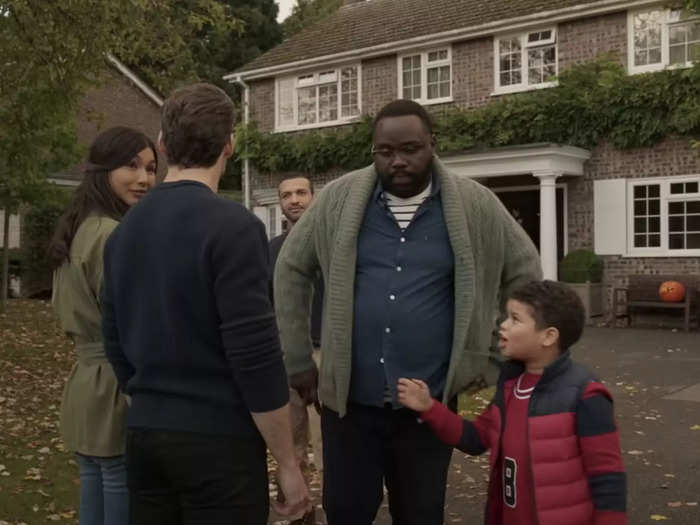
According to Out, recent Disney films and television shows have attempted to be more forward about LGBTQ inclusion but still have a lot of work to do.
Disney's live-action "Jungle Book" (2021) featured the company's first major gay character, MacGregor, although he never explicitly refers to himself as queer, while Pixar's "Lightyear" faced controversy for including — and then removing and reintroducing — a kiss between Hawthorne and her female partner.
Perhaps the best examples of Disney's queer representation are the Marvel movie "The Eternals" and the Disney+ "High School Musical" reboot series, both of which include explicitly LGBTQ characters and storylines, according to Out.
Phastos in Marvel's "The Eternals" was the superhero franchise's first explicitly out character, with his story featuring several moments between him, his husband, and their son. "The Eternals" came 13 years after the Marvel Cinematic Universe's first film, "Iron Man."
"High School Musical: The Musical: The Series," on the other hand, has championed LGBTQ characters since its first season. Two characters, Carlos and Seb, navigate their budding relationship while participating in the school musical.
Frankie Rodriguez, who plays Carlos, told Gay Times that he loved the show's presentation of sexuality as a non-issue and not the only defining aspect of his character.
"I hope that viewers can take away that being yourself really will get you so much further than trying to be somebody else, and I think that can spread across literally anything," he said to Gay Times.
Legal action has also prompted Disney to change its stance on LGBTQ issues.
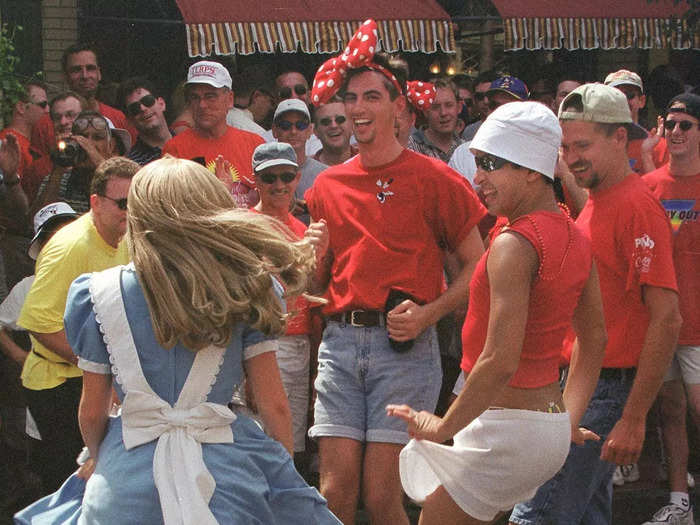
In Disneyland's early years, the park had regular date nights for teenagers and younger couples in Orange County, California. On top of riding rollercoasters and eating funnel cake, couples could also dance together to a live band.
According to South Florida Gay News, Disney's ongoing policy was that "couples only are allowed on the dance floor [male/female]."
The policy still stood by the 1980s, and according to QNotes Carolinas, prompted Orange County local Andrew Exler into action. In September 1980, Exler and a friend defied the policy, attending date night and dancing together. They were quickly escorted from the premises by security.
"Our crime was disco dancing," Exler recalled, according to QNotes Carolinas. "We didn't touch, we didn't kiss, we didn't bump and grind. We simply danced to the sounds of some horrible disco band."
The two swiftly filed a lawsuit against Disney, claiming the ban on same-sex dancing violated the California Unruh Civil Rights Act.
They won the suit in 1984, marking the first time Disneyland had lost a legal battle in court, QNotes Carolinas said.
The company later relaxed its dancing policy, with Disney spokesperson Al Flores telling the Los Angeles Times in 1985 that the company sees "a lot of situations where two girls come together and want to dance and ask to. We have always said no, but we changed our minds," QNotes Carolinas reported.
Park events for Disney's queer fans, such as Gay Days, have become popular.
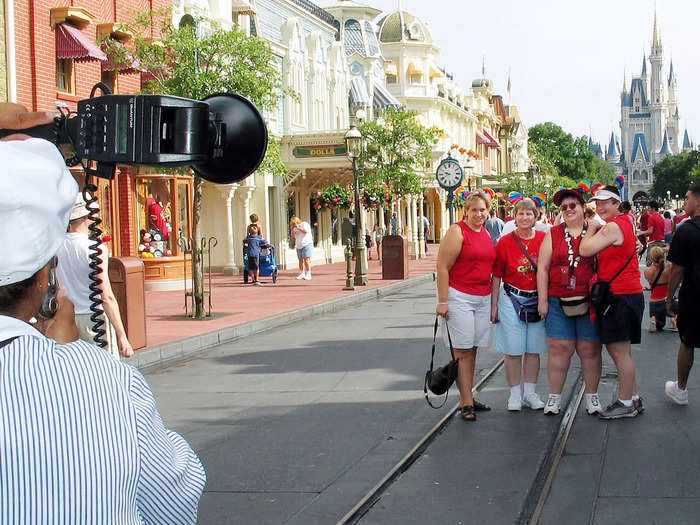
In recent years, Disney parks have been home to unofficial LGBTQ pride events. The most popular of these festivities is Gay Days, an Orlando-based gathering held annually in the first week of June.
Visitors participate in celebrations around the city, attend all the Disney sites, and partake in the festivities like Red Shirt Day at Disney World's Magic Kingdom park.
Gay Days date back to 1991 and often bring in over 150,000 visitors, according to the Tampa Bay Times.
Gay Days CEO Joseph Clark told USA Today his first visit in 2008 still was "life-changing."
"It was just a whole group of people together, and there was no judgment going on. There was no 'Oh my God, they're gay,'" Clark said. "Like yep, most of us were, or we had friends and allies with us that weren't, who were just welcoming to the community."
Disney now sponsors official events for LGBTQ pride, selling merchandise and special food items.
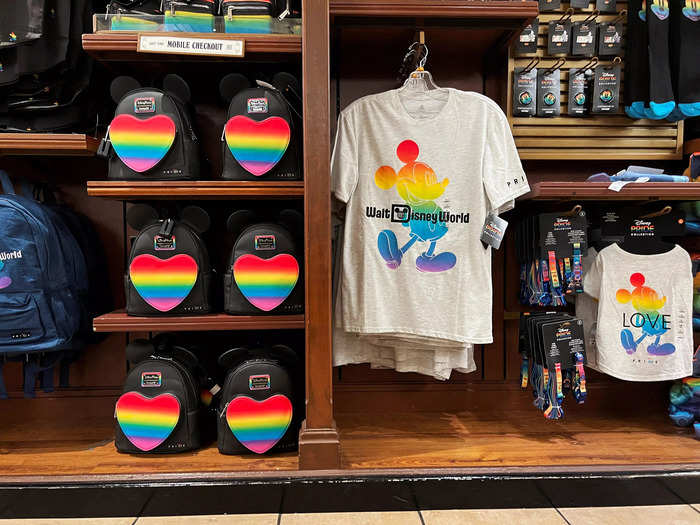
While the House of Mouse hasn't explicitly supported Gay Days, they have marked the occasion with charity donations and special Pride-themed food and merchandise, Tampa Bay Times reported.
On the 10th anniversary of Gay Days in June 2000, Orlando Weekly reported that the event had pushed Disney towards accepting its queer fans and forced the company to be more outrightly supportive of LGBTQ issues. It also likely led to Disney's first Pride event, Disneyland Paris Pride.
The event was originally called Magical Pride and launched in 2019, extending visitor hours in the park and offering various events, parades, and merchandise, according to Every Queer.
In 2023, Disney announced its first US-based Pride event at its Disneyland California park called Disneyland After Dark: Pride Nite. According to Disney Parks' official tweet, the event "will have themed entertainment, Disney characters, specialty menu items," and more.
The Walt Disney World park also plans to host a major conference for LGBTQ workplace rights in September 2023, Tampa Bay Times reported.
Disney employees have also pushed the company to make progress on its LGBTQ support.
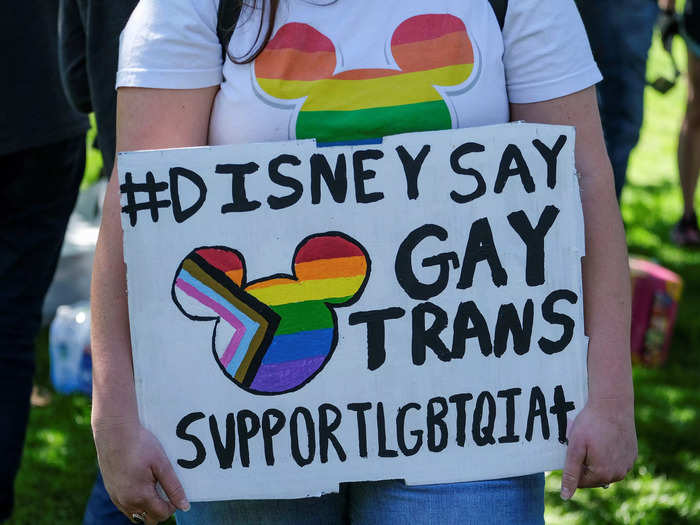
In 1995, the Los Angeles Times reported on a new Disneyland Lesbian and Gay United Employees group, or LEAGUE, that planned to organize around LGBTQ issues, host guest speakers, and plan Disney-related projects.
Steven Valkenburg, LEAGUE co-chair, told the LA Times the group wanted to work in tandem with Disney.
"We're not trying to overthrow the company," he said. "We're working with the company for positive change."
One of those changes became Disney's new domestic partnership policy, which allowed gay couples the same health and dental benefits as married heterosexual couples. Although Disney was one of the last companies to introduce this policy, the LA Times reported, it was a major step forward for equality.
Disney employees also spoke out against former Disney CEO Bob Chapek's botched response to Florida GOP's so-called "Don't Say Gay" bill.
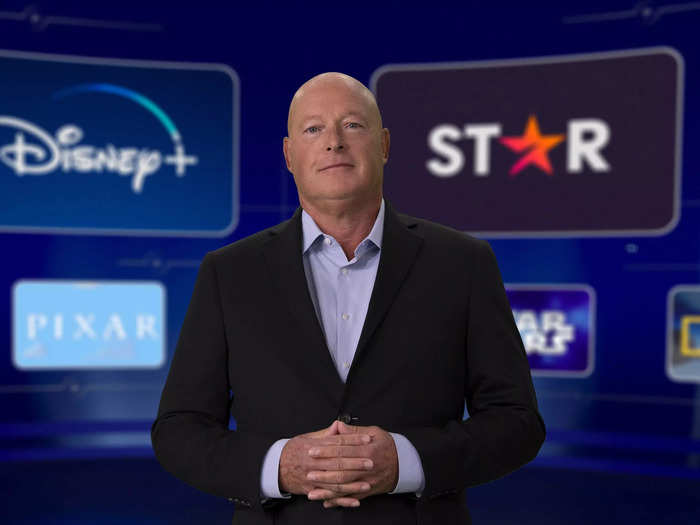
Employees recently made headlines for their March 2022 walkout after former Disney CEO Bob Chapek's botched response to Florida's controversial Parental Rights law, which limits instructions about gender identity and sexual orientation in some classrooms, dubbed the "Don't Say Gay" law by Democrats and LGBTQ rights groups.
At first, Chapek did not outright condemn the bill, leading to employee outrage, according to NBC News.
News about Disney's donations to Florida Republican politicians also sparked controversy, Politico reported.
"The recent statements and lack of action by TWDC [The Walt Disney Co.] leadership regarding the 'Don't Say Gay or Trans' bill have utterly failed to match the magnitude of the threat to LGBTQIA+ safety represented by this legislation," the employees said on a now-defunct website whereischapek.com, according to NBC News.
The walkout resulted in a direct apology from Chapek to employees.
"It is clear that this is not just an issue about a bill in Florida, but instead yet another challenge to basic human rights," he said in a letter. "You needed me to be a stronger ally in the fight for equal rights and I let you down."
Chapek later stepped down as CEO in November 2022.
Florida's controversial LGBTQ legislation and Disney's response to it have led to an ongoing feud.
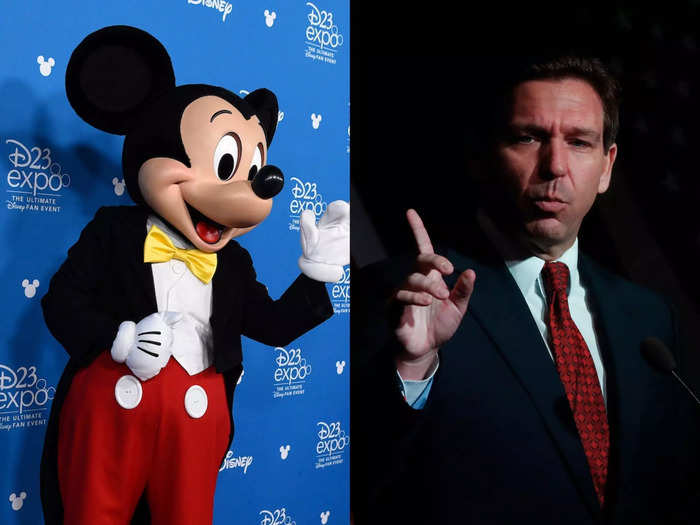
When Disney announced it would work to repeal the so-called "Don't Say Gay" bill in early 2022, Florida Gov. Ron DeSantis said the company had "crossed the line."
"For Disney to come out and put a statement and say that the bill should have never passed and that they are going to actively work to repeal it, I think, one, was fundamentally dishonest but, two, I think that crossed the line," DeSantis said at a press conference.
In a statement, Disney said the bill "should never have passed and should never have been signed into law."
"Our goal as a company is for this law to be repealed by the legislature or struck down in the courts, and we remain committed to supporting the national and state organizations working to achieve that," the statement read.
DeSantis responded by taking aim at the company's special tax status, signing a bill repealing it in April 2022 before signing another bill in February 2023 that replaced its special district with an oversight committee of DeSantis-appointed board members.
But in late March, state legislators discovered a loophole by Disney that stripped DeSantis' board of its power. In the agreement, Disney invoked an obscure property law known as Rule Against Perpetuities, setting the date for 21 years "after the death of the last survivor of the descendants of King Charles III, King of England living as of the date of this Declaration."
Now, DeSantis and his administration have vowed to go on the offensive against the House of Mouse, with the Florida governor threatening to build a state prison next to Disney World's resort.
The move could scare Disney or continue the feud, an expert told Insider, but Disney CEO Bob Iger told Time last week he would be "glad" to sit down with DeSantis "to discuss all of this."
Popular Right Now
Popular Keywords
Advertisement